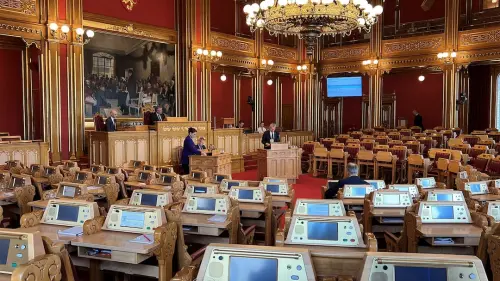In a post-session buzz at Norway's parliament, Jens Stoltenberg was met with excitement beyond the ordinary. Visiting teenagers eagerly pointed at him, and a cleaner paused her work to snap a photo.
Stoltenberg, one of Norway's most recognizable figures internationally, has left an immediate impact on politics after his decade-long leadership of the alliance.
Following his recent appointment as finance minister on February 4, his Labour party saw a notable 10-point increase in opinion polls, potentially positioning it for victory in the upcoming September election—a scenario deemed unlikely just weeks ago due to voter discontent over the rising cost of living.
The 65-year-old Oslo native, a former two-time prime minister, currently defers the premiership to his ally Jonas Gahr Støre, stating he does not seek the role again.
Referred to as "Stoltenback" by Norwegian media upon his return, Stoltenberg's popularity surge is attributed to his handling of the 2011 terrorist attacks and his leadership roles during the war in Ukraine and Donald Trump's presidency.
Renowned for steering NATO during Trump's tenure, he earned the nickname "Trump whisperer" for persuading the former US president to remain committed to the alliance.
Stoltenberg’s re-entry into Norwegian politics led to social media frenzy among Labour politicians, with posts hailing his return and boosted by the Eurosceptic Centre Party's shift in late January.
In the event of a Labour victory, policies would likely emphasize continued oil and gas exploration, and stronger ties with the EU. Notably, Norway, though not an EU member, participates in the European common market.
Should Labour secure a win in September, it would mark a rare instance of a non-populist incumbent government securing re-election globally.
Adapting to politics back home, Stoltenberg finds Norway's political landscape less polarized compared to his international experiences, emphasizing the importance of respectful debates and mutual regard among politicians.
